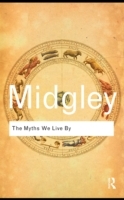With a new Introduction by the author
'An elegant and sane little book. - The New Statesman
Myths, as Mary Midgley argues in this powerful book, are everywhere. In political thought they sit at the heart of theories of human nature and the social contract; in economics in the pursuit of self interest; and in science the idea of human beings as machines, which originates in the seventeenth century, is a today a potent force. Far from being the opposite of science, however, Midgley argues that myth is a central part of it. Myths are neither lies nor mere stories but a network of powerful symbols for interpreting the world. Tackling a dazzling array of subjects such as philosophy, evolutionary psychology, animals, consciousness and the environment in her customary razor-sharp prose, The Myths We Live By reminds us of the powerful role of symbolism and the need to take our imaginative life seriously.
Mary Midgley is a moral philosopher and the author of many books including Wickedness, Evolution as a Religion, Beast and Man and Science and Poetry. All are published in Routledge Classics.

